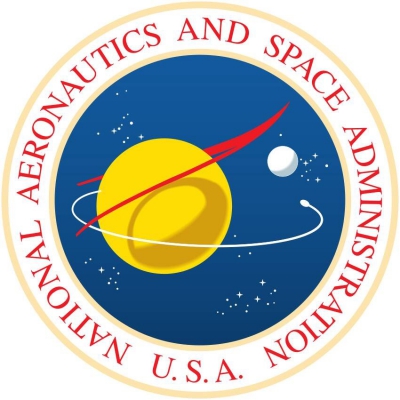Genesis was a NASA sample-return probe that collected a sample of solar wind particles and returned them to Earth for analysis. It was the first NASA sample-return mission to return material since the Apollo program, and the first to return material from beyond the orbit of the Moon. Genesis was launched on August 8, 2001, and the sample return capsule crash-landed in Utah on September 8, 2004, after a design flaw prevented the deployment of its drogue parachute. The crash contaminated many of the sample collectors. Although most were damaged, some of the collectors were successfully recovered.The Genesis science team demonstrated that some of the contamination could be removed or avoided, and that the solar wind particles could be analyzed using a variety of approaches, achieving all of the mission's major science objectives.
The National Aeronautics and Space Administration (NASA ) is an independent agency of the U.S. federal government responsible for the civilian space program, as well as aeronautics and space research.NASA was established in 1958, succeeding the National Advisory Committee for Aeronautics (NACA). The new agency was to have a distinctly civilian orientation, encouraging peaceful applications in space science. Since its establishment, most US space exploration efforts have been led by NASA, including the Apollo Moon landing missions, the Skylab space station, and later the Space Shuttle. NASA is supporting the International Space Station and is overseeing the development of the Orion spacecraft, the Space Launch System, Commercial Crew vehicles, and the planned Lunar Gateway space station. The agency is also responsible for the Launch Services Program, which provides oversight of launch operations and countdown management for uncrewed NASA launches.
NASA's science is focused on better understanding Earth through the Earth Observing System; advancing heliophysics through the efforts of the Science Mission Directorate's Heliophysics Research Program; exploring bodies throughout the Solar System with advanced robotic spacecraft such as New Horizons; and researching astrophysics topics, such as the Big Bang, through the Great Observatories and associated programs.

2004Sep, 8
NASA's unmanned spacecraft Genesis crash-lands when its parachute fails to open.
Choose Another Date
Events on 2004
- 1Jan
Pervez Musharraf
In a vote of confidence, General Pervez Musharraf wins 658 out of 1,170 votes in the Electoral College of Pakistan, and according to Article 41(8) of the Constitution of Pakistan, is "deemed to be elected" to the office of President until October 2007. - 2Feb
Roger Federer
Swiss tennis player Roger Federer becomes the No. 1 ranked men's singles player, a position he will hold for a record 237 weeks. - 1May
European Union
Cyprus, Czech Republic, Estonia, Hungary, Latvia, Lithuania, Malta, Poland, Slovakia, and Slovenia join the European Union, celebrated at the residence of the Irish President in Dublin. - 26May
Oklahoma City bombing
United States Army veteran Terry Nichols is found guilty of 161 state murder charges for helping carry out the Oklahoma City bombing. - 6Jun
A. P. J. Abdul Kalam
Tamil is established as a "classical language" by the President of India, Dr A. P. J. Abdul Kalam, in a joint sitting of the two houses of the Indian Parliament.

 English
English  español
español  français
français  português
português  русский
русский  العربية
العربية  简体中文
简体中文 